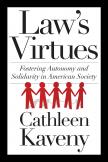Finding a Third Way
This is an important book on religion, morality and law. In Law’s Virtues, Cathleen Kaveny, alegal scholar and moral theologian, argues that law “can, should and does” function as a moral teacher even in the United States, a pluralistic representative democracy committed to individual liberty and legal laissez-faire. What she offers here is “a constructive appropriation and application of Thomistic legal thought to the contemporary context,” consistent with her standing in the legal academy as a leading proponent of Roman Catholic jurisprudence.
St. Thomas Aquinas taught that law, rightly understood, teaches virtue. This is Kaveny’s theoretical starting point, making her an outlier on the contemporary jurisprudential scene. For that alone, she should be complimented. To insist that law is an effective moral teacher, Kaveny must counter the liberal approach now in vogue that claims law operates as a negative constraint and is not concerned with teaching moral lessons.
She argues intelligently and very specifically that this approach is far too narrow to account for many federal laws, including the Civil Rights Act and the Americans with Disabilities Act. For Kaveny, these laws do teach by pointing beyond their technical requirements in order to begin realizing their ultimate normative visions. But she also endorses Aquinas’ caveat: the role of law in promoting virtue has its limits. So her moral idealism and optimism are properly tempered by moral realism and the limits of ordinary virtue.
Claiming, much less understanding, any relationship between law and morality in our pluralistic society is never easy, yet Kaveny’s provocative and nuanced approach sets a new standard.
With her framework in place, Kaveny then asks what virtues the law should teach. Her answer is: autonomy, as understood by the “perfectionistic” liberal Joseph Raz; and solidarity, as framed by Pope John Paul II. Both virtues are related to human flourishing in a social context. For Raz, autonomy is the “capacity to be the ‘part-author’ of one’s own life.” John Paul II defines solidarity as “a firm and persevering determination to commit oneself to the common good.” With the good of individuals and the common good intertwined, Kaveny can now insist that “individual autonomy is ultimately a social achievement.” This move is nothing but an appropriately contemporary spin on a traditional Catholic position.
Championing her view that law is best understood as a moral teacher, Kaveny applies this framework to contemporary questions about abortion, genetics and euthanasia. She also examines the morality of voting, in critical conversation with the 2007 U.S. bishops’ voting guide, Faithful Citizenship. To begin, Kaveny establishes her Catholic bona fides: “I think that the practices commonly described as abortion and euthanasia generally involve the wrongful killing of human beings.” She then proposes a “third way” for wise lawmaking, valuing the socially important moral message of law while rejecting the view of those who would move directly from moral condemnation to legal prohibition. Her analysis of these hot-button legal and moral issues is balanced and exhaustive (with extensive citations).
On the morality of voting, Kaveny argues that “intrinsic evil,” a highly technical term from Catholic moral theology, is often misused by American Catholics as the catchword in many discussions about voting for pro-choice candidates. Her presentation on this topic is a tour de force. This is reason enough to look forward to Kaveny’s promised book on complicity. Moving beyond the “culture wars” model of political engagement, Cathleen Kaveny digs deep in Law’s Virtues to deliver a must read for anyone who cares about the relationship of law and morality in our pluralistic society.
This article also appeared in print, under the headline “Finding a Third Way,” in the January 21-28, 2013, issue.








